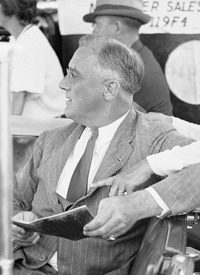
Obama offered this analysis of FDR’s alleged fiscal conservatism during the course of a July 22 town hall meeting at the University of Maryland, reports CNSNews.com. Said the President: “FDR comes in, he tries all these things with the New Deal; but FDR, contrary to myth, was pretty fiscally conservative.”
Now if Obama had been referring to the FDR of 1932, then Governor of New York, his statement might be accurate. During the presidential campaign Roosevelt railed against incumbent President Herbert Hoover’s big-spending, government-growing ways. He called for “immediate and drastic reductions of all public expenditures”; “abolishing useless commissions and offices, consolidating departments and bureaus, and eliminating extravagances”; and a “sound currency to be maintained at all hazards.”
Once in office, however, Roosevelt adopted Hoover’s approach and took it to dizzying heights. “FDR tripled taxes and spending more than doubled from 1933 to 1940,” Jim Powell, author of FDR’s Folly: How Roosevelt and His New Deal Prolonged the Great Depression, told CNSNews.com. “That was the biggest increase in peacetime spending in American history. Before that, the biggest increases in spending came during wars.” So much for FDR’s fiscal conservatism.
Obama continued: “And so after the initial efforts of the New Deal and it looked like the economy was growing again, FDR then presented a very severe austerity budget. And suddenly, in 1937, the economy started going down again. And, ultimately, what really pulled America out of the Great Depression was World War II.”
There are a number of fallacies in this line of reasoning.
First, as Powell pointed out, the economy hadn’t improved much by 1937; unemployment was still at 17 percent. Moreover, argues Jonathan M. Finegold Catalan, the seeming improvement in 1935 and 1936 was largely the result of credit expansion fostered by the Federal Reserve and thus was doomed from the start.
Second, FDR’s 1937 budget was hardly one of “very severe austerity.” Though the deficit had fallen by $2.1 billion since the previous year, federal spending had decreased by only $600 million; the difference was covered by increased tax receipts. Furthermore, while spending had taken a hit in 1937, it was still higher than in all years prior to 1936 — hardly the massive cutback Obama made it out to be.
Third, spending cuts did not cause the 1937 downturn. “Explaining Roosevelt’s recession by pointing at a decrease in government spending is severely dishonest,” writes Finegold Catalan. He observes that even the drop in deficit spending can’t explain the recession because the 1938 deficit was even smaller than the supposedly austere 1937 one, yet the economy rebounded from the downturn that year. He maintains that, in addition to the inevitable bust after a period of artificial expansion, the 1937 recession was caused by New Deal policies that “maintained high real wages in the face of stagnating productivity” and “made the stock market extremely volatile and susceptible to otherwise minor changes.”
Fourth, World War II did not pull America out of the Great Depression. Yes, it reduced the unemployment rate — but only by drafting 10 million young men into the armed forces. Real recovery, as Robert Higgs and other economists have shown, did not occur until after the war, when government spending shrank rapidly.
With every one of his premises false, it is not surprising, then, that Obama’s conclusion is also dubious: “Some have said, I think rightly, that we’ve got to be careful that any efforts we have to reduce the deficit don’t hamper economic recovery, because the worst thing we can do for the deficit is continue to have really bad growth or another recession.” The President, of course, is referring to cutting spending as the kind of effort that would “hamper economic recovery,” which, as we have seen, is simply not the case. He is correct, however, that deficit reduction could be bad for the economy — if that alleged reduction is in the form of higher taxes and phony spending cuts.
Unfortunately, since most of Washington holds the same premises as Obama, that is the kind of deficit-reduction package most likely to pass. If it does, everyone in officialdom will also claim the mantle of fiscal conservatism even as FDR’s welfare-warfare state continues to grow apace.\
Photo of Franklin Delano Roosevelt: AP Images



